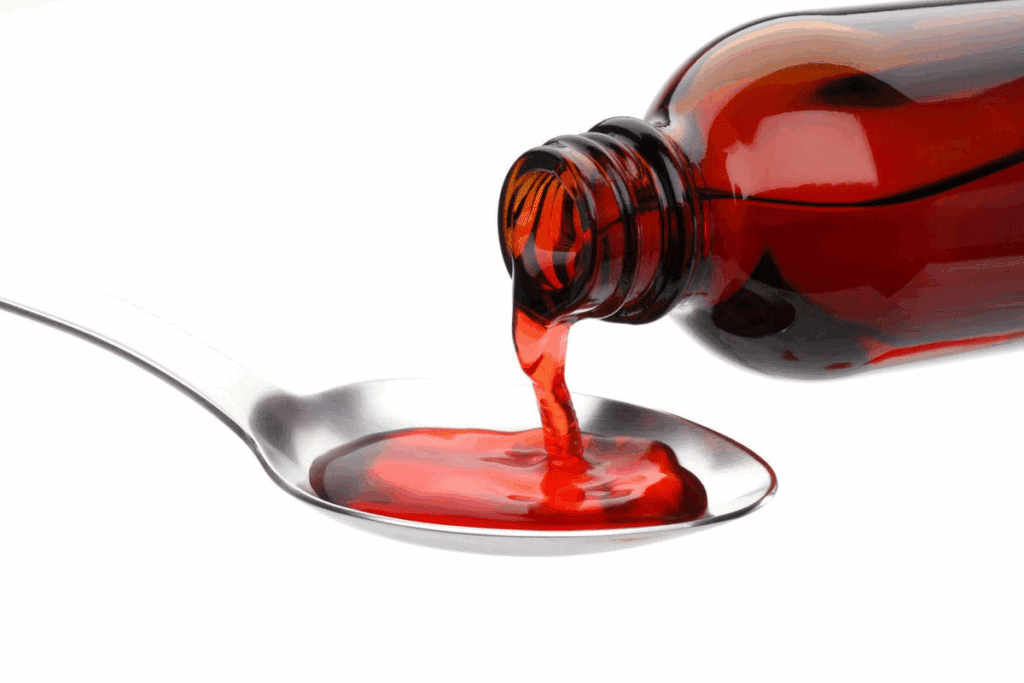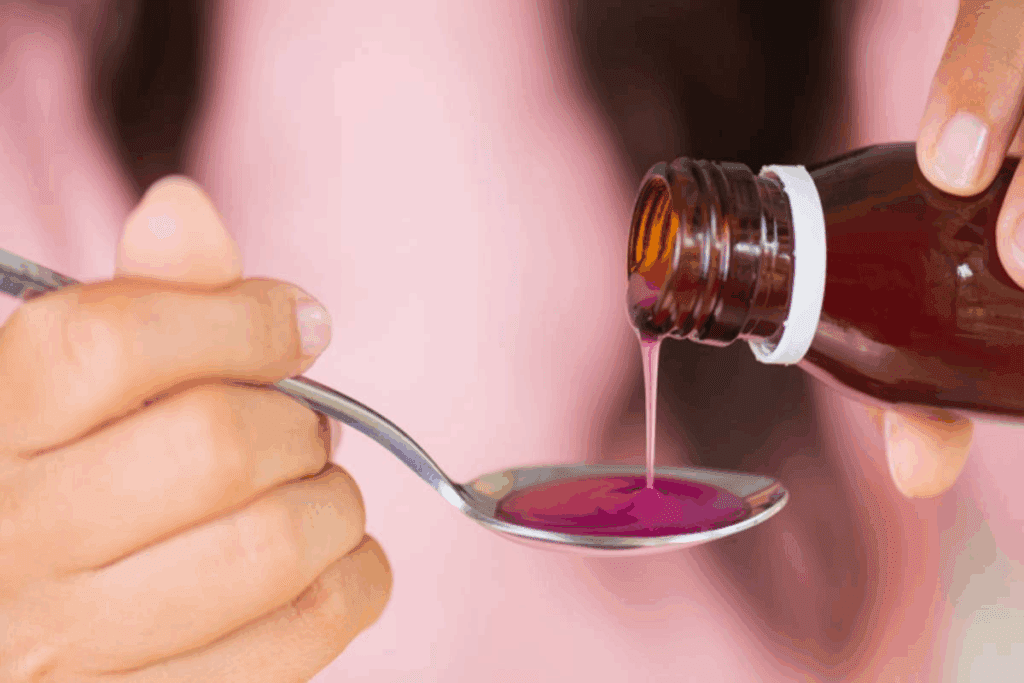Last Updated on November 27, 2025 by Ugurkan Demir

When a sore throat hits, we all want to feel better fast. Benadryl, with diphenhydramine, might help with sore throats caused by allergies. Let’s see if it can ease throat pain.
Diphenhydramine is great for allergy symptoms like itchy eyes and runny nose. But, it’s not always the best for sore throats. It depends on why your throat hurts.
Knowing when Benadryl can help ease throat pain is key. We’ll look at how Benadryl works and other ways to feel better.
Do Benadryl help with sore throat? Understand how the antihistamine can reduce post-nasal drip and inflammation, offering relief.

Knowing what causes sore throats and their symptoms is key to feeling better. Sore throats can come from many things, like environmental irritants, infections, and allergies. Finding out the cause helps decide the best treatment.
Sore throats are common and can hurt, feel irritated, or scratchy. The pain can be always there or only when you swallow or talk. Knowing why you have a sore throat is important for treating it right.
Many things can cause sore throats. Viral infections like the common cold and influenza are common. Bacterial infections, like strep throat, also cause sore throats and need special treatment. Allergies, like pollen or dust, can also make your throat sore.
Each cause of sore throat has its own signs. For example, a viral infection might bring fever, cough, and runny nose. Strep throat, a bacterial infection, has severe pain, white patches on the tonsils, and fever without cold symptoms.
Allergy-related sore throats might have itchy eyes, sneezing, and nasal congestion. Irritants in the environment can cause throat pain without other symptoms. Knowing these differences helps pick the right treatment.
Some sore throats can be treated at home, but others need a doctor. For example, strep throat needs antibiotics, while allergies might need antihistamines. Natural remedies like lime and honey can also help. It’s interesting to see if lime helps with sore throat, as citrus has been used for throat issues.

To understand Benadryl, we need to look at its main ingredient and how it affects the body. It’s a common over-the-counter drug for allergy symptoms, hay fever, and the common cold.
The key ingredient in Benadryl is diphenhydramine, an antihistamine. It blocks histamine, a body substance that causes allergies. Diphenhydramine binds to histamine receptors, stopping allergic reactions.
When histamine is released, it can lead to itching, sneezing, and runny nose. By blocking these receptors, diphenhydramine reduces these symptoms. This helps people with allergies feel better.
Diphenhydramine, as an antihistamine, has properties that help treat allergies. It crosses the blood-brain barrier, causing drowsiness. This is why Benadryl is also used as a sleep aid.
But, its sedative effect can be a problem. It can make you feel drowsy and affect your thinking. It’s important to take it as directed and be aware of any interactions with other drugs.
| Property | Effect |
| Antihistamine | Blocks histamine receptors, reducing allergic symptoms |
| Sedative | Causes drowsiness, can impair cognitive function |
| Crosses blood-brain barrier | Contributes to sedative effect |
In summary, Benadryl’s ability to ease allergy symptoms comes from diphenhydramine and its antihistamine effects. Knowing how Benadryl works helps people use it wisely and understand its benefits.
Benadryl helps with sore throats because of its main ingredient, diphenhydramine. This ingredient fights histamine, which can cause allergic reactions and sore throats.
Many studies have looked into how diphenhydramine helps with throat pain. Clinical research shows it can lessen sore throats after surgeries that use intubation.
A study in a well-known medical journal found diphenhydramine helps a lot. Patients who took it felt much better than those who didn’t. The researchers said diphenhydramine’s antihistamine effects reduce throat inflammation and pain.
More studies back up using Benadryl for sore throats. For example, a trial with post-operative sore throat patients showed Benadryl worked well. The study concluded Benadryl could help with post-operative throat pain.
“The use of diphenhydramine as an adjunct therapy for post-operative sore throat has shown promising results, providing a new way to manage this common problem after surgery.”
Even though the results are good, Benadryl isn’t a fix for all sore throats. Its success depends on the sore throat’s cause. For bacterial infections, antibiotics are needed, and Benadryl just helps with symptoms.
It’s best to talk to doctors about sore throats. They can tell if Benadryl or other treatments are right for you, based on your symptoms and what’s causing them.
Sore throats from allergies can be really annoying. Benadryl might help. It works as an antihistamine to fight off the allergy reaction.
Allergies happen when our immune system reacts to something it shouldn’t, like pollen. This reaction makes histamine, which swells blood vessels. This swelling causes congestion and throat irritation.
Medical Expert, an allergist, notes, “Many people don’t realize how allergies can cause sore throats.”
“The link between allergic rhinitis and throat symptoms is well-established. Antihistamines can play a critical role in managing these symptoms.”
Knowing this connection is key to feeling better. Benadryl blocks histamine receptors. This reduces the allergic reaction and helps with throat irritation.
Antihistamines, like Benadryl, are good at fighting allergy symptoms. This includes sore throats. By lessening the allergic response, Benadryl can ease throat pain.
| Symptom | Benadryl Effectiveness |
| Sneezing | High |
| Itchy Throat | High |
| Throat Irritation | Moderate to High |
The table shows Benadryl works well for sneezing and itchy throats. It’s also good for throat irritation. Always take the right amount to get the best results.
In summary, Benadryl is a good choice for sore throats caused by allergies. Knowing how allergies affect the throat and how antihistamines work helps us choose the right treatment.
When we talk about Benadryl for sore throats, it’s key to know its role in cold and flu symptoms. Benadryl, an antihistamine, helps with symptoms like sore throats from colds and flu.
Benadryl offers short-term relief for sore throats from colds or flu. It eases throat irritation. But, it’s important to know it’s not a cure for sore throats.
For lasting relief, antihistamines like Benadryl aren’t enough. They help manage symptoms but don’t fix the sore throat’s cause.
Studies on Benadryl for sore throats show mixed results. Some say it helps more than placebos for cold symptoms, including sore throats. For example, a study might show Benadryl reduces throat discomfort better than a placebo.
But, how well Benadryl works can differ. It depends on the person, how bad the symptoms are, and the Benadryl type. Benadryl can dry out nasal passages and lessen throat irritation. Yet, its effect on sore throats might not be as strong as on other symptoms like sneezing or runny nose.
In summary, Benadryl can help with sore throats from colds and flu. But, it should be part of a bigger treatment plan. Always talk to a doctor for the best way to handle sore throats and other cold or flu symptoms.
It’s important to know what Benadryl can and can’t do. Benadryl can help with some sore throats, but it’s not good for bacterial infections like strep throat. These infections need medical treatment.
Benadryl is for allergic reactions, not bacterial infections. Strep throat, caused by Streptococcus pyogenes, needs antibiotics. Benadryl can ease swelling and discomfort but doesn’t cure the infection.
It’s key to know the difference between viral and bacterial sore throats. Viral sore throats might get better with Benadryl if allergies are involved. But bacterial infections need a different treatment.
If you think you have strep throat, see a doctor. They can test you with a throat swab and give antibiotics. Waiting too long can cause serious problems like kidney issues or rheumatic fever.
The table below shows how Benadryl works for different sore throats:
| Condition | Benadryl’s Role | Recommended Treatment |
| Allergic Sore Throat | May provide relief by reducing allergic symptoms | Antihistamines like Benadryl, avoiding allergens |
| Strep Throat (Bacterial Infection) | Limited relief; does not treat the infection | Antibiotics prescribed by a healthcare provider |
Always talk to a doctor to figure out why you have a sore throat and what to do. Benadryl is good for allergies, but it’s not a cure for bacterial infections.
Understanding how to use Benadryl for sore throats is key. It has diphenhydramine, which helps with sore throat symptoms. You can take it in different ways to feel better.
Benadryl comes in tablets, capsules, and liquid. Adults usually take 25 to 50 mg every 4 to 6 hours. Don’t take more than 300 mg in 24 hours. Always follow the package or ask a doctor for advice.
For kids, the dose depends on their weight and age. Always talk to a pediatrician or doctor to find the right dose.
Benadryl is not usually gargled, but some types can be. Always check the label or ask a doctor before gargling. If it’s okay, mix the dose with water, gargle, and spit it out.
How long and how often to take Benadryl depends on your symptoms and the product’s instructions. You can take it every 4 to 6 hours as needed. But, if your symptoms get worse or don’t go away, see a doctor.
Here’s a quick guide on using Benadryl for sore throats:
| Administration Method | Dosage | Frequency |
| Oral | 25-50 mg | Every 4-6 hours |
| Topical (if recommended) | As per product instructions | As needed |
Benadryl can help with sore throats from allergies. But, it’s not for bacterial infections or serious conditions. Always see a doctor if your symptoms don’t improve.
Benadryl is often used to help with a swollen throat. But, it’s important to know how well it works and its risks. We’ll look at how Benadryl can help with throat swelling and when you should get emergency care.
Benadryl has diphenhydramine, an antihistamine that fights swelling from allergies. It’s good for swelling caused by allergies. Benadryl can ease the swelling by blocking histamine receptors.
This action helps reduce the allergic swelling in the throat. It’s a relief for those with allergy-related throat inflammation.
Benadryl is okay for mild to moderate allergies. But, severe swelling that blocks breathing is a big emergency. If you can’t breathe well, swell fast, or have other serious symptoms, get help right away.
It’s key to know when swelling is just for Benadryl and when it’s a serious emergency. Here’s a table to help you see the difference:
| Symptom | Benadryl Manageable | Emergency Care Required |
| Difficulty Breathing | No | Yes |
| Rapid Swelling | No | Yes |
| Mild Swelling | Yes | No |
Knowing the good and bad of Benadryl for a swollen throat is key for safe relief. Always talk to a doctor if you’re not sure about your symptoms or treatment.
Using Benadryl for sore throat relief needs you to know its side effects and precautions. It’s a good remedy, but knowing its risks is key for safe use.
Benadryl, like any drug, has side effects. Common ones include:
These side effects are usually mild and short-lived. But if they don’t go away or get worse, see a doctor.
Benadryl can react with other drugs, causing bad effects. Some important interactions include:
Also, there are certain health conditions or medications Benadryl shouldn’t be taken with. Always talk to a doctor before using Benadryl, if you have health issues or are on other meds.
Knowing Benadryl’s side effects and drug interactions helps you use it wisely for sore throat. If you’re not sure about using Benadryl, talk to a healthcare expert for advice.
Looking for a natural way to ease sore throat pain? Lime might be a good choice. It’s a natural option compared to medicines like Benadryl. Let’s dive into what science says about lime’s benefits.
Lime is packed with vitamin C, which helps fight sore throat. Its acidity can break down mucus, making it easier to clear out. Plus, its antioxidants boost your immune system. Citrus fruits like lime have been used for centuries in various cultures for their medicinal properties, including soothing throat irritations.
Adding honey to lime juice can make it even more effective. Honey’s antimicrobial properties and ability to soothe irritated areas are well-known. Mixing equal parts of lime juice and honey in warm water can create a soothing gargle that may help reduce throat inflammation and discomfort.
While lime and honey are great, other natural remedies can also help. These include:
Remember, natural remedies can offer relief, but they shouldn’t replace medical treatment if your sore throat persists or is severe. Always talk to a healthcare professional for the right diagnosis and treatment.
Sore throats can come from many causes, and the right treatment depends on finding the root cause. Benadryl, with diphenhydramine, helps with sore throats from allergies. But, for bacterial infections like strep throat, you need medical help.
When looking for sore throat relief, it’s key to consider the pros and cons of each option. Benadryl can give quick relief, but it’s important to stick to the dosage and know the possible side effects. Natural remedies like lime and honey can also help soothe a sore throat.
Knowing the reasons for sore throats and the treatments available helps us make smart choices. Whether we pick over-the-counter meds like Benadryl or natural remedies, being informed helps us manage our symptoms well. This way, we can get the best relief for our sore throats.
Benadryl can help with sore throats from allergies or after surgery. But, it won’t work on bacterial infections like strep throat. You need to see a doctor for those.
No, Benadryl doesn’t fight strep throat, which is a bacterial infection. You need antibiotics, not just an antihistamine like Benadryl.
Yes, Benadryl can ease swelling from allergies. But, if your throat is very swollen, you might need urgent care to breathe.
Yes, lime and honey can help a sore throat. Honey’s antibacterial properties and lime’s soothing effects can ease throat pain.
Lime juice might soothe a sore throat because it’s anti-inflammatory. But, always check with a doctor to make sure.
Yes, lime juice is a natural way to ease a sore throat. Adding honey can make it even better.
Benadryl can make you feel drowsy, dry your mouth, and dizzy. Always take it as directed and talk to a doctor if you have side effects.
You can take Benadryl by mouth or gargle with it. Just make sure to follow the right dosage and instructions.
Benadryl is best for short-term sore throat relief. If your symptoms last, see a doctor for the right treatment.
National Health Service (NHS). (2025). Does Benadryl Help with Sore Throat What You. Retrieved from https://www.nhs.uk/conditions/sore-throat/causes/
Subscribe to our e-newsletter to stay informed about the latest innovations in the world of health and exclusive offers!